Analyzing Consumer Purchase Intentions in the Sharing Economy
VerifiedAdded on 2021/02/20
|12
|3501
|282
Report
AI Summary
This report investigates the impacts of the sharing economy on consumer purchase intentions, using Uber as a case study. It begins with an introduction to the sharing economy, discussing its rapid growth and prevalence, especially in the UK, and defines key concepts. The report outlines aims, objectives, research questions, and the study's justification, scope, and limitations. Chapter 2 provides a literature review, exploring definitional clarity, benefits of the sharing economy, and its relationship to consumer buying behavior, drawing on various sources. The methodology chapter, Chapter 3, details the research paradigm, approach, data collection methods, and ethical considerations, along with the strengths and weaknesses of the chosen approach. The report explores how the sharing economy impacts consumer behavior, highlighting both its advantages and disadvantages, and analyzing how factors like trust, pricing, and ease of use influence consumer decisions to buy services.
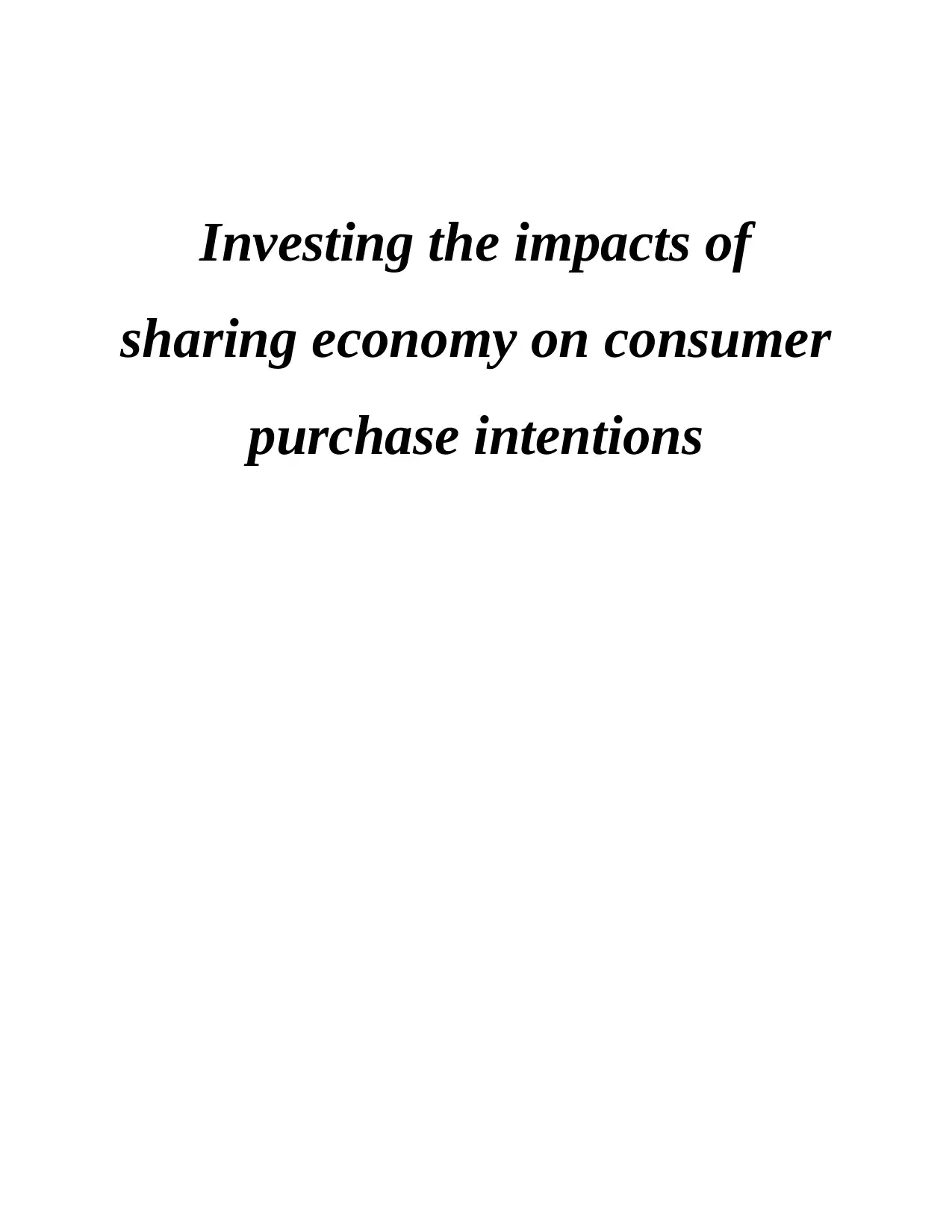
Investing the impacts of
sharing economy on consumer
purchase intentions
sharing economy on consumer
purchase intentions
Paraphrase This Document
Need a fresh take? Get an instant paraphrase of this document with our AI Paraphraser
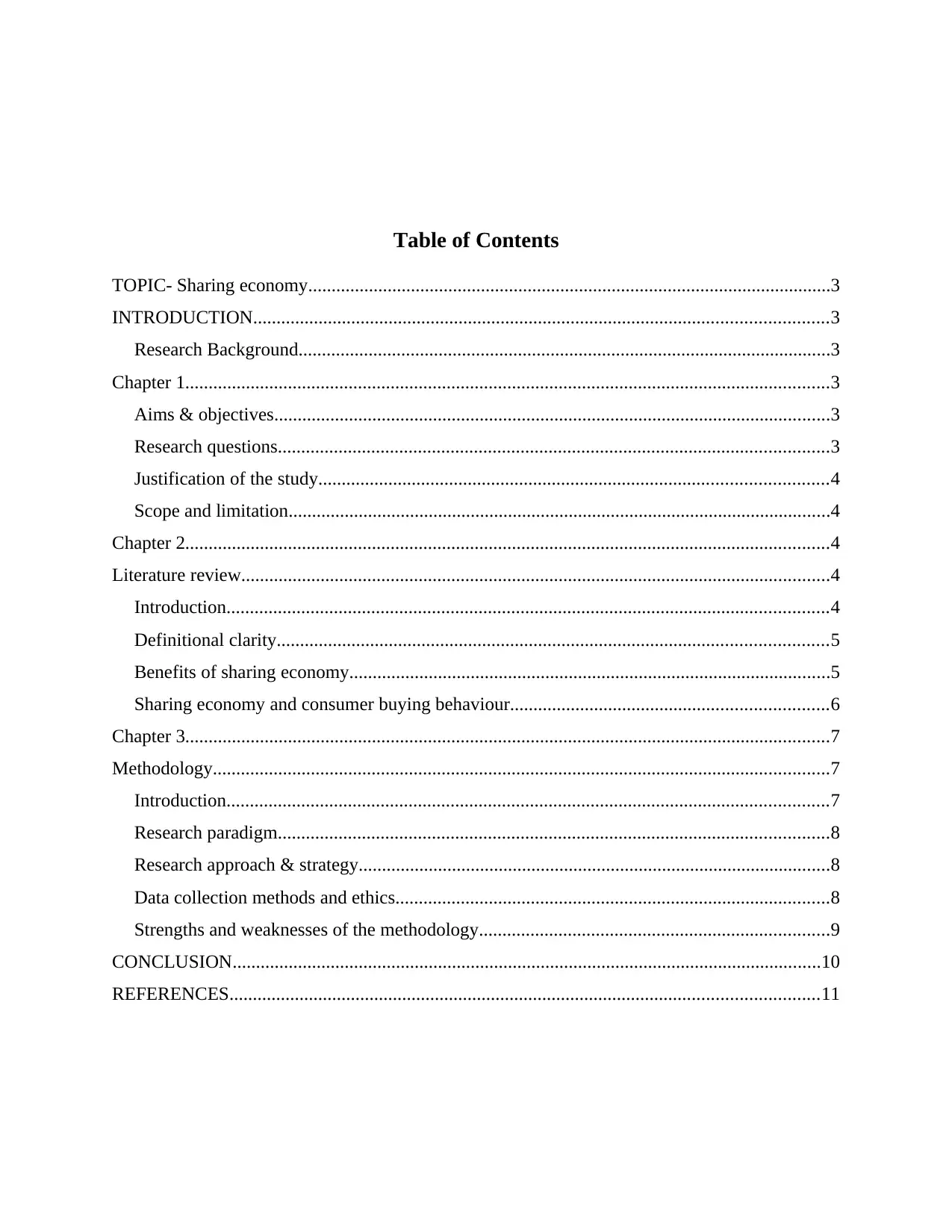
Table of Contents
TOPIC- Sharing economy................................................................................................................3
INTRODUCTION...........................................................................................................................3
Research Background..................................................................................................................3
Chapter 1..........................................................................................................................................3
Aims & objectives.......................................................................................................................3
Research questions......................................................................................................................3
Justification of the study.............................................................................................................4
Scope and limitation....................................................................................................................4
Chapter 2..........................................................................................................................................4
Literature review..............................................................................................................................4
Introduction.................................................................................................................................4
Definitional clarity......................................................................................................................5
Benefits of sharing economy.......................................................................................................5
Sharing economy and consumer buying behaviour....................................................................6
Chapter 3..........................................................................................................................................7
Methodology....................................................................................................................................7
Introduction.................................................................................................................................7
Research paradigm......................................................................................................................8
Research approach & strategy.....................................................................................................8
Data collection methods and ethics.............................................................................................8
Strengths and weaknesses of the methodology...........................................................................9
CONCLUSION..............................................................................................................................10
REFERENCES..............................................................................................................................11
TOPIC- Sharing economy................................................................................................................3
INTRODUCTION...........................................................................................................................3
Research Background..................................................................................................................3
Chapter 1..........................................................................................................................................3
Aims & objectives.......................................................................................................................3
Research questions......................................................................................................................3
Justification of the study.............................................................................................................4
Scope and limitation....................................................................................................................4
Chapter 2..........................................................................................................................................4
Literature review..............................................................................................................................4
Introduction.................................................................................................................................4
Definitional clarity......................................................................................................................5
Benefits of sharing economy.......................................................................................................5
Sharing economy and consumer buying behaviour....................................................................6
Chapter 3..........................................................................................................................................7
Methodology....................................................................................................................................7
Introduction.................................................................................................................................7
Research paradigm......................................................................................................................8
Research approach & strategy.....................................................................................................8
Data collection methods and ethics.............................................................................................8
Strengths and weaknesses of the methodology...........................................................................9
CONCLUSION..............................................................................................................................10
REFERENCES..............................................................................................................................11
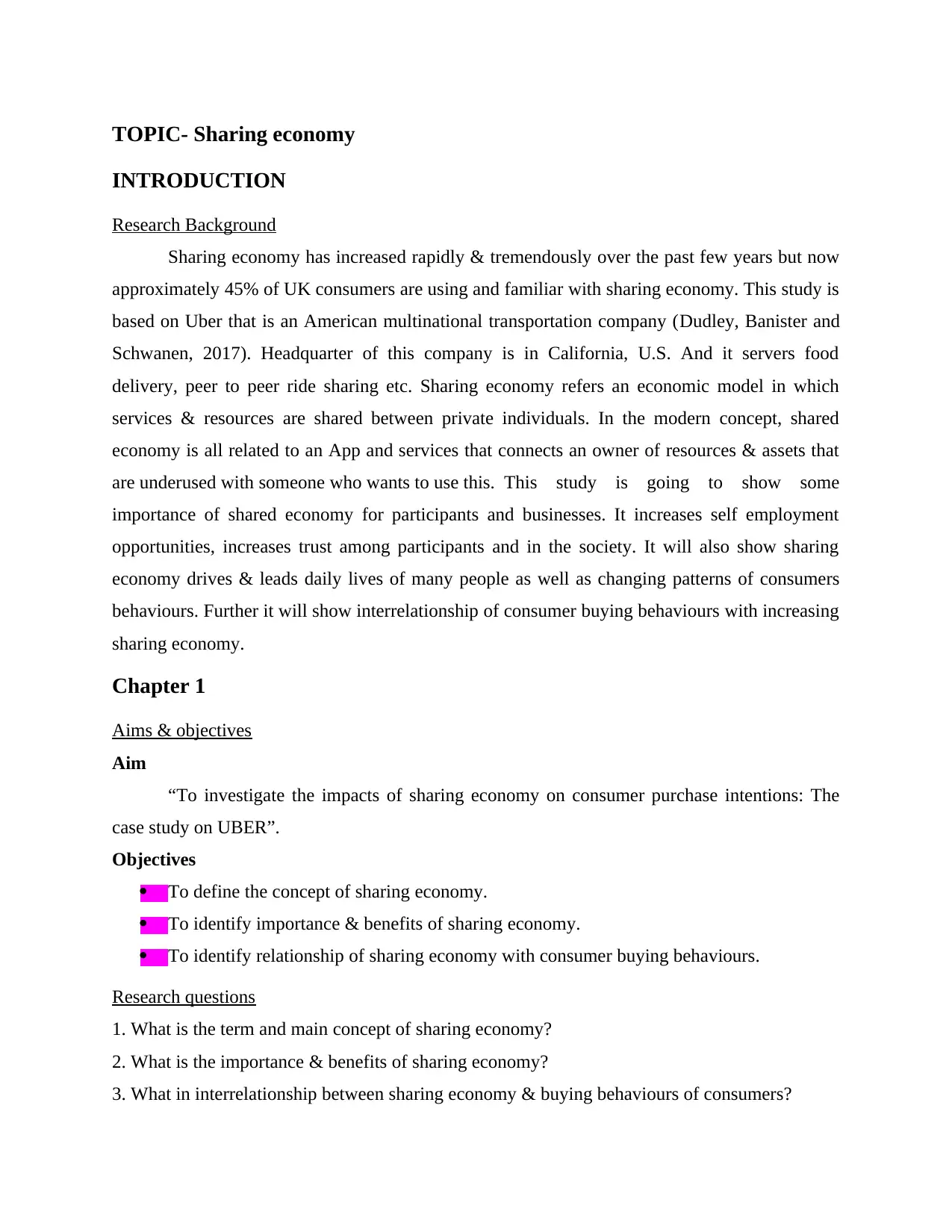
TOPIC- Sharing economy
INTRODUCTION
Research Background
Sharing economy has increased rapidly & tremendously over the past few years but now
approximately 45% of UK consumers are using and familiar with sharing economy. This study is
based on Uber that is an American multinational transportation company (Dudley, Banister and
Schwanen, 2017). Headquarter of this company is in California, U.S. And it servers food
delivery, peer to peer ride sharing etc. Sharing economy refers an economic model in which
services & resources are shared between private individuals. In the modern concept, shared
economy is all related to an App and services that connects an owner of resources & assets that
are underused with someone who wants to use this. This study is going to show some
importance of shared economy for participants and businesses. It increases self employment
opportunities, increases trust among participants and in the society. It will also show sharing
economy drives & leads daily lives of many people as well as changing patterns of consumers
behaviours. Further it will show interrelationship of consumer buying behaviours with increasing
sharing economy.
Chapter 1
Aims & objectives
Aim
“To investigate the impacts of sharing economy on consumer purchase intentions: The
case study on UBER”.
Objectives
To define the concept of sharing economy.
To identify importance & benefits of sharing economy.
To identify relationship of sharing economy with consumer buying behaviours.
Research questions
1. What is the term and main concept of sharing economy?
2. What is the importance & benefits of sharing economy?
3. What in interrelationship between sharing economy & buying behaviours of consumers?
INTRODUCTION
Research Background
Sharing economy has increased rapidly & tremendously over the past few years but now
approximately 45% of UK consumers are using and familiar with sharing economy. This study is
based on Uber that is an American multinational transportation company (Dudley, Banister and
Schwanen, 2017). Headquarter of this company is in California, U.S. And it servers food
delivery, peer to peer ride sharing etc. Sharing economy refers an economic model in which
services & resources are shared between private individuals. In the modern concept, shared
economy is all related to an App and services that connects an owner of resources & assets that
are underused with someone who wants to use this. This study is going to show some
importance of shared economy for participants and businesses. It increases self employment
opportunities, increases trust among participants and in the society. It will also show sharing
economy drives & leads daily lives of many people as well as changing patterns of consumers
behaviours. Further it will show interrelationship of consumer buying behaviours with increasing
sharing economy.
Chapter 1
Aims & objectives
Aim
“To investigate the impacts of sharing economy on consumer purchase intentions: The
case study on UBER”.
Objectives
To define the concept of sharing economy.
To identify importance & benefits of sharing economy.
To identify relationship of sharing economy with consumer buying behaviours.
Research questions
1. What is the term and main concept of sharing economy?
2. What is the importance & benefits of sharing economy?
3. What in interrelationship between sharing economy & buying behaviours of consumers?
⊘ This is a preview!⊘
Do you want full access?
Subscribe today to unlock all pages.

Trusted by 1+ million students worldwide
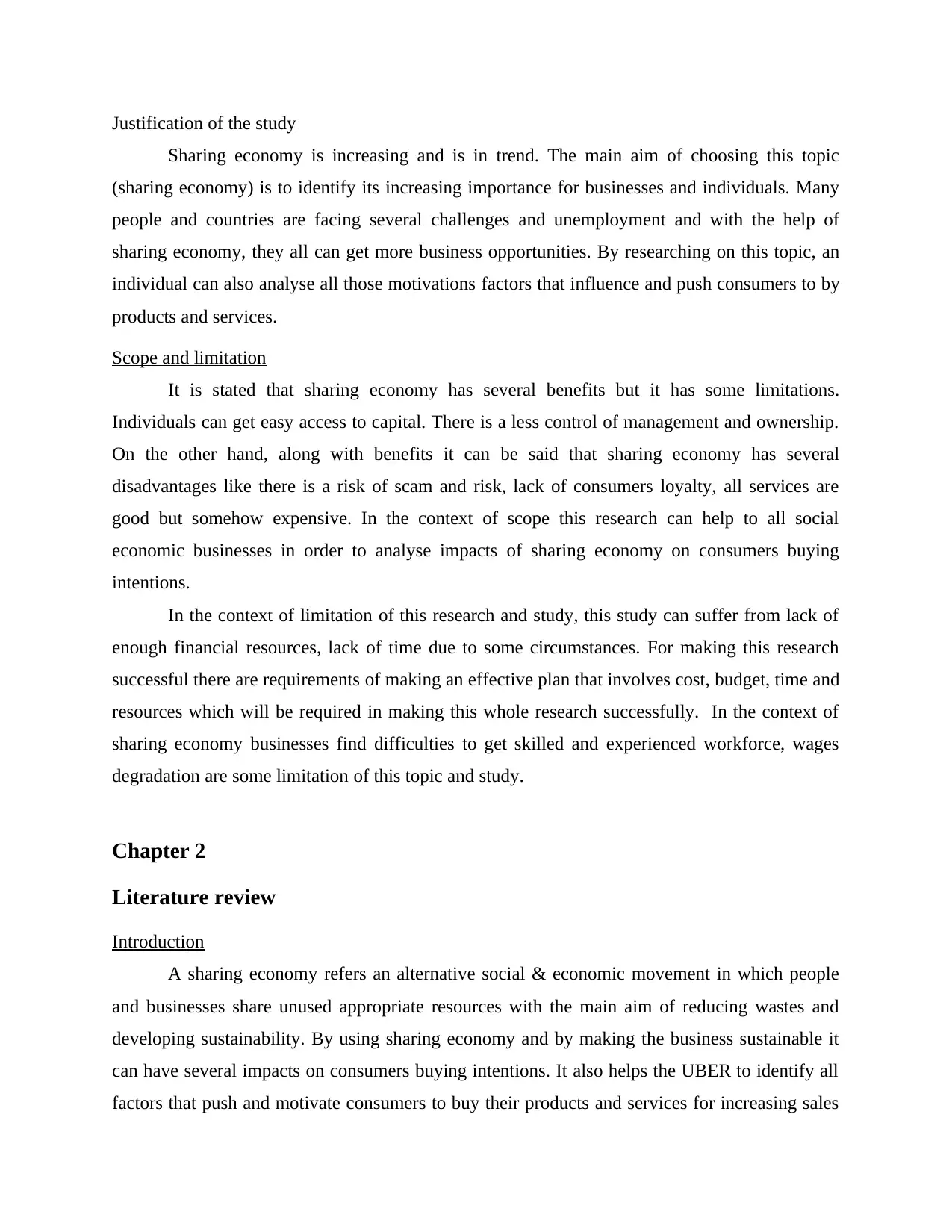
Justification of the study
Sharing economy is increasing and is in trend. The main aim of choosing this topic
(sharing economy) is to identify its increasing importance for businesses and individuals. Many
people and countries are facing several challenges and unemployment and with the help of
sharing economy, they all can get more business opportunities. By researching on this topic, an
individual can also analyse all those motivations factors that influence and push consumers to by
products and services.
Scope and limitation
It is stated that sharing economy has several benefits but it has some limitations.
Individuals can get easy access to capital. There is a less control of management and ownership.
On the other hand, along with benefits it can be said that sharing economy has several
disadvantages like there is a risk of scam and risk, lack of consumers loyalty, all services are
good but somehow expensive. In the context of scope this research can help to all social
economic businesses in order to analyse impacts of sharing economy on consumers buying
intentions.
In the context of limitation of this research and study, this study can suffer from lack of
enough financial resources, lack of time due to some circumstances. For making this research
successful there are requirements of making an effective plan that involves cost, budget, time and
resources which will be required in making this whole research successfully. In the context of
sharing economy businesses find difficulties to get skilled and experienced workforce, wages
degradation are some limitation of this topic and study.
Chapter 2
Literature review
Introduction
A sharing economy refers an alternative social & economic movement in which people
and businesses share unused appropriate resources with the main aim of reducing wastes and
developing sustainability. By using sharing economy and by making the business sustainable it
can have several impacts on consumers buying intentions. It also helps the UBER to identify all
factors that push and motivate consumers to buy their products and services for increasing sales
Sharing economy is increasing and is in trend. The main aim of choosing this topic
(sharing economy) is to identify its increasing importance for businesses and individuals. Many
people and countries are facing several challenges and unemployment and with the help of
sharing economy, they all can get more business opportunities. By researching on this topic, an
individual can also analyse all those motivations factors that influence and push consumers to by
products and services.
Scope and limitation
It is stated that sharing economy has several benefits but it has some limitations.
Individuals can get easy access to capital. There is a less control of management and ownership.
On the other hand, along with benefits it can be said that sharing economy has several
disadvantages like there is a risk of scam and risk, lack of consumers loyalty, all services are
good but somehow expensive. In the context of scope this research can help to all social
economic businesses in order to analyse impacts of sharing economy on consumers buying
intentions.
In the context of limitation of this research and study, this study can suffer from lack of
enough financial resources, lack of time due to some circumstances. For making this research
successful there are requirements of making an effective plan that involves cost, budget, time and
resources which will be required in making this whole research successfully. In the context of
sharing economy businesses find difficulties to get skilled and experienced workforce, wages
degradation are some limitation of this topic and study.
Chapter 2
Literature review
Introduction
A sharing economy refers an alternative social & economic movement in which people
and businesses share unused appropriate resources with the main aim of reducing wastes and
developing sustainability. By using sharing economy and by making the business sustainable it
can have several impacts on consumers buying intentions. It also helps the UBER to identify all
factors that push and motivate consumers to buy their products and services for increasing sales
Paraphrase This Document
Need a fresh take? Get an instant paraphrase of this document with our AI Paraphraser
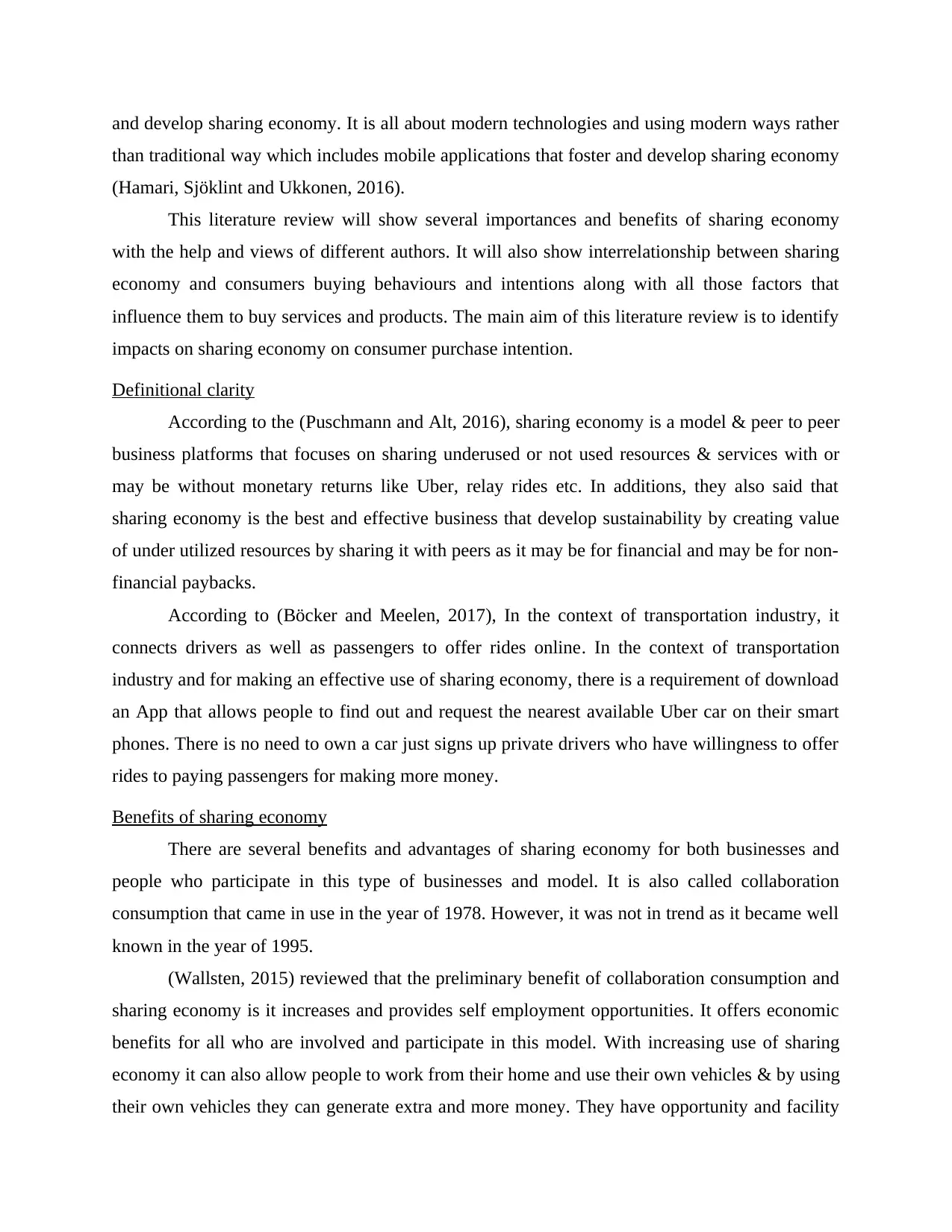
and develop sharing economy. It is all about modern technologies and using modern ways rather
than traditional way which includes mobile applications that foster and develop sharing economy
(Hamari, Sjöklint and Ukkonen, 2016).
This literature review will show several importances and benefits of sharing economy
with the help and views of different authors. It will also show interrelationship between sharing
economy and consumers buying behaviours and intentions along with all those factors that
influence them to buy services and products. The main aim of this literature review is to identify
impacts on sharing economy on consumer purchase intention.
Definitional clarity
According to the (Puschmann and Alt, 2016), sharing economy is a model & peer to peer
business platforms that focuses on sharing underused or not used resources & services with or
may be without monetary returns like Uber, relay rides etc. In additions, they also said that
sharing economy is the best and effective business that develop sustainability by creating value
of under utilized resources by sharing it with peers as it may be for financial and may be for non-
financial paybacks.
According to (Böcker and Meelen, 2017), In the context of transportation industry, it
connects drivers as well as passengers to offer rides online. In the context of transportation
industry and for making an effective use of sharing economy, there is a requirement of download
an App that allows people to find out and request the nearest available Uber car on their smart
phones. There is no need to own a car just signs up private drivers who have willingness to offer
rides to paying passengers for making more money.
Benefits of sharing economy
There are several benefits and advantages of sharing economy for both businesses and
people who participate in this type of businesses and model. It is also called collaboration
consumption that came in use in the year of 1978. However, it was not in trend as it became well
known in the year of 1995.
(Wallsten, 2015) reviewed that the preliminary benefit of collaboration consumption and
sharing economy is it increases and provides self employment opportunities. It offers economic
benefits for all who are involved and participate in this model. With increasing use of sharing
economy it can also allow people to work from their home and use their own vehicles & by using
their own vehicles they can generate extra and more money. They have opportunity and facility
than traditional way which includes mobile applications that foster and develop sharing economy
(Hamari, Sjöklint and Ukkonen, 2016).
This literature review will show several importances and benefits of sharing economy
with the help and views of different authors. It will also show interrelationship between sharing
economy and consumers buying behaviours and intentions along with all those factors that
influence them to buy services and products. The main aim of this literature review is to identify
impacts on sharing economy on consumer purchase intention.
Definitional clarity
According to the (Puschmann and Alt, 2016), sharing economy is a model & peer to peer
business platforms that focuses on sharing underused or not used resources & services with or
may be without monetary returns like Uber, relay rides etc. In additions, they also said that
sharing economy is the best and effective business that develop sustainability by creating value
of under utilized resources by sharing it with peers as it may be for financial and may be for non-
financial paybacks.
According to (Böcker and Meelen, 2017), In the context of transportation industry, it
connects drivers as well as passengers to offer rides online. In the context of transportation
industry and for making an effective use of sharing economy, there is a requirement of download
an App that allows people to find out and request the nearest available Uber car on their smart
phones. There is no need to own a car just signs up private drivers who have willingness to offer
rides to paying passengers for making more money.
Benefits of sharing economy
There are several benefits and advantages of sharing economy for both businesses and
people who participate in this type of businesses and model. It is also called collaboration
consumption that came in use in the year of 1978. However, it was not in trend as it became well
known in the year of 1995.
(Wallsten, 2015) reviewed that the preliminary benefit of collaboration consumption and
sharing economy is it increases and provides self employment opportunities. It offers economic
benefits for all who are involved and participate in this model. With increasing use of sharing
economy it can also allow people to work from their home and use their own vehicles & by using
their own vehicles they can generate extra and more money. They have opportunity and facility
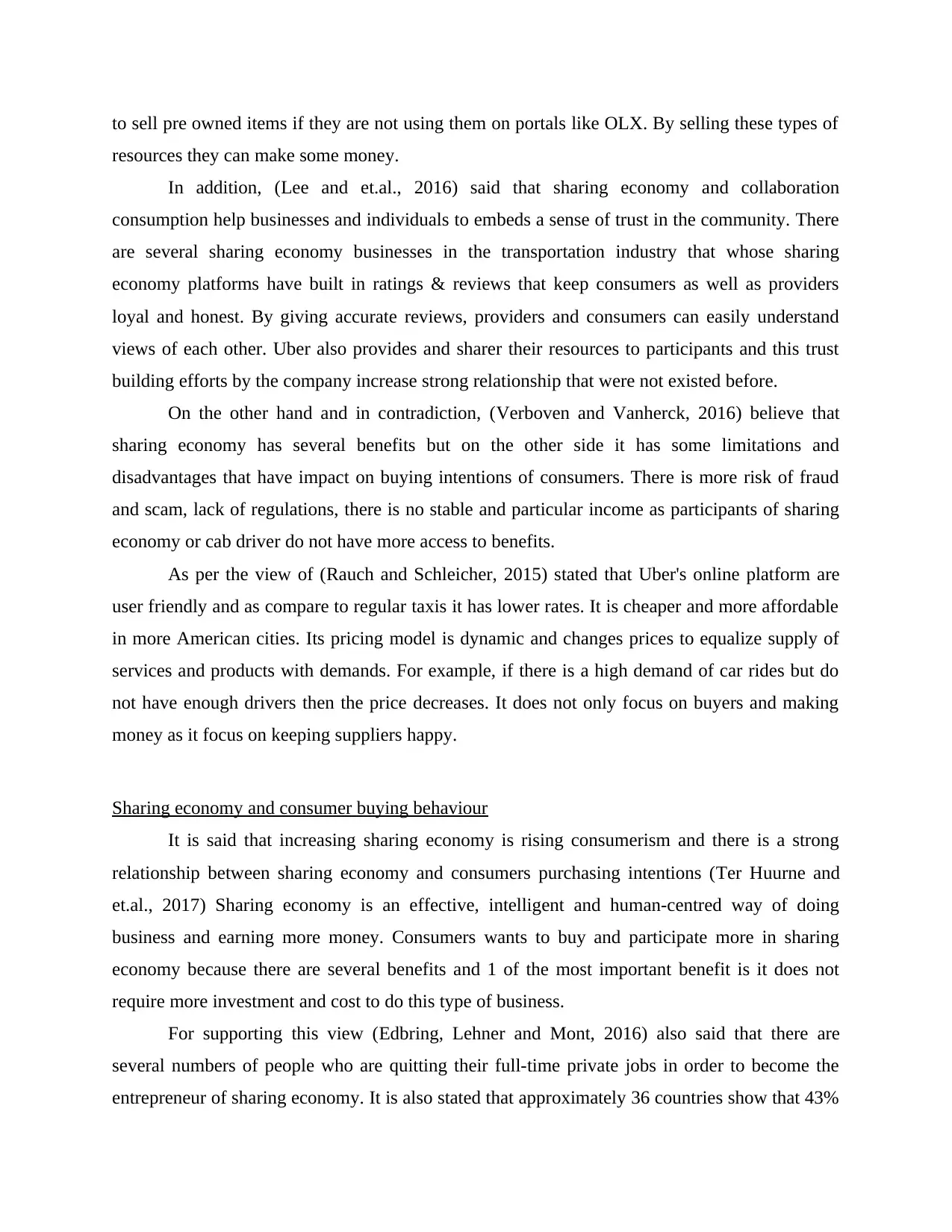
to sell pre owned items if they are not using them on portals like OLX. By selling these types of
resources they can make some money.
In addition, (Lee and et.al., 2016) said that sharing economy and collaboration
consumption help businesses and individuals to embeds a sense of trust in the community. There
are several sharing economy businesses in the transportation industry that whose sharing
economy platforms have built in ratings & reviews that keep consumers as well as providers
loyal and honest. By giving accurate reviews, providers and consumers can easily understand
views of each other. Uber also provides and sharer their resources to participants and this trust
building efforts by the company increase strong relationship that were not existed before.
On the other hand and in contradiction, (Verboven and Vanherck, 2016) believe that
sharing economy has several benefits but on the other side it has some limitations and
disadvantages that have impact on buying intentions of consumers. There is more risk of fraud
and scam, lack of regulations, there is no stable and particular income as participants of sharing
economy or cab driver do not have more access to benefits.
As per the view of (Rauch and Schleicher, 2015) stated that Uber's online platform are
user friendly and as compare to regular taxis it has lower rates. It is cheaper and more affordable
in more American cities. Its pricing model is dynamic and changes prices to equalize supply of
services and products with demands. For example, if there is a high demand of car rides but do
not have enough drivers then the price decreases. It does not only focus on buyers and making
money as it focus on keeping suppliers happy.
Sharing economy and consumer buying behaviour
It is said that increasing sharing economy is rising consumerism and there is a strong
relationship between sharing economy and consumers purchasing intentions (Ter Huurne and
et.al., 2017) Sharing economy is an effective, intelligent and human-centred way of doing
business and earning more money. Consumers wants to buy and participate more in sharing
economy because there are several benefits and 1 of the most important benefit is it does not
require more investment and cost to do this type of business.
For supporting this view (Edbring, Lehner and Mont, 2016) also said that there are
several numbers of people who are quitting their full-time private jobs in order to become the
entrepreneur of sharing economy. It is also stated that approximately 36 countries show that 43%
resources they can make some money.
In addition, (Lee and et.al., 2016) said that sharing economy and collaboration
consumption help businesses and individuals to embeds a sense of trust in the community. There
are several sharing economy businesses in the transportation industry that whose sharing
economy platforms have built in ratings & reviews that keep consumers as well as providers
loyal and honest. By giving accurate reviews, providers and consumers can easily understand
views of each other. Uber also provides and sharer their resources to participants and this trust
building efforts by the company increase strong relationship that were not existed before.
On the other hand and in contradiction, (Verboven and Vanherck, 2016) believe that
sharing economy has several benefits but on the other side it has some limitations and
disadvantages that have impact on buying intentions of consumers. There is more risk of fraud
and scam, lack of regulations, there is no stable and particular income as participants of sharing
economy or cab driver do not have more access to benefits.
As per the view of (Rauch and Schleicher, 2015) stated that Uber's online platform are
user friendly and as compare to regular taxis it has lower rates. It is cheaper and more affordable
in more American cities. Its pricing model is dynamic and changes prices to equalize supply of
services and products with demands. For example, if there is a high demand of car rides but do
not have enough drivers then the price decreases. It does not only focus on buyers and making
money as it focus on keeping suppliers happy.
Sharing economy and consumer buying behaviour
It is said that increasing sharing economy is rising consumerism and there is a strong
relationship between sharing economy and consumers purchasing intentions (Ter Huurne and
et.al., 2017) Sharing economy is an effective, intelligent and human-centred way of doing
business and earning more money. Consumers wants to buy and participate more in sharing
economy because there are several benefits and 1 of the most important benefit is it does not
require more investment and cost to do this type of business.
For supporting this view (Edbring, Lehner and Mont, 2016) also said that there are
several numbers of people who are quitting their full-time private jobs in order to become the
entrepreneur of sharing economy. It is also stated that approximately 36 countries show that 43%
⊘ This is a preview!⊘
Do you want full access?
Subscribe today to unlock all pages.

Trusted by 1+ million students worldwide
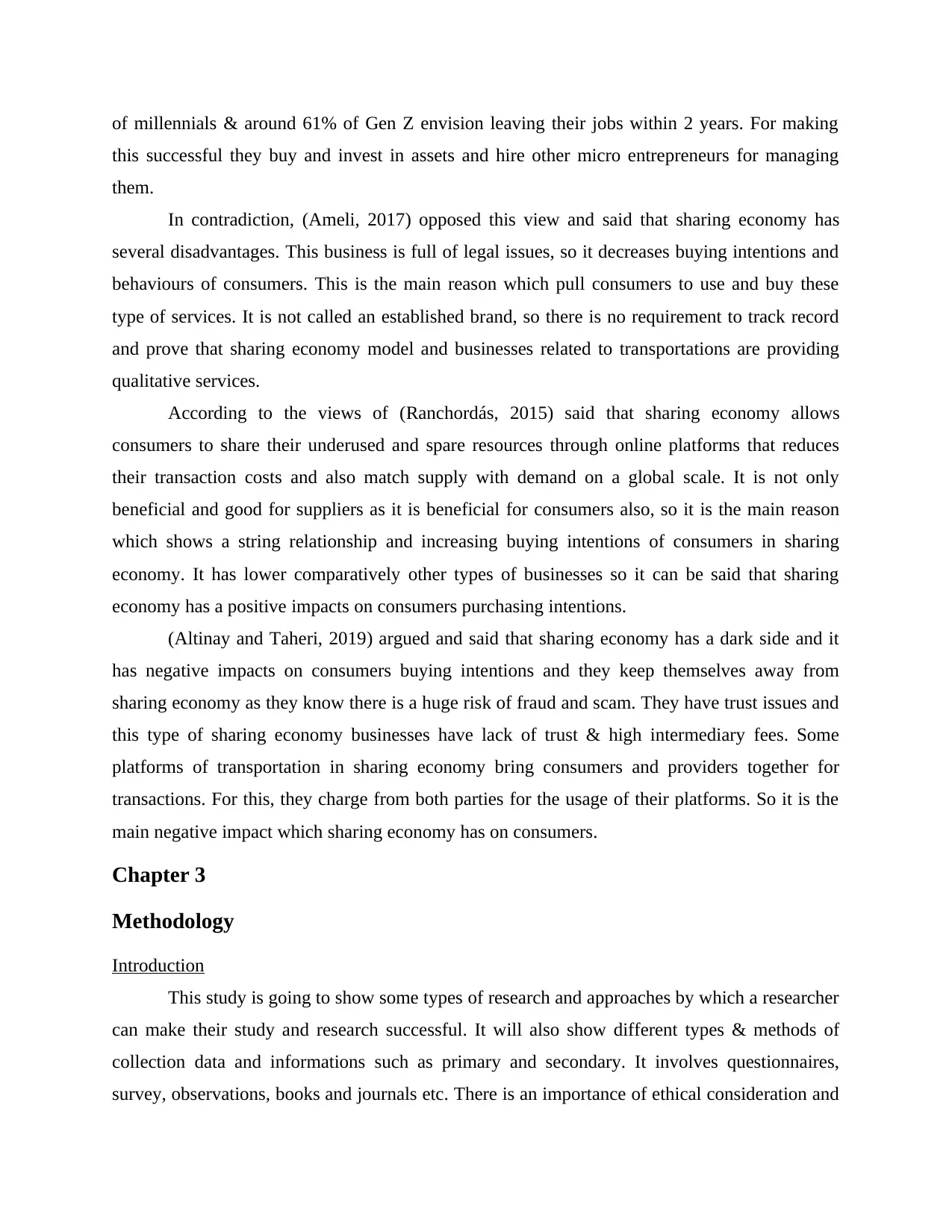
of millennials & around 61% of Gen Z envision leaving their jobs within 2 years. For making
this successful they buy and invest in assets and hire other micro entrepreneurs for managing
them.
In contradiction, (Ameli, 2017) opposed this view and said that sharing economy has
several disadvantages. This business is full of legal issues, so it decreases buying intentions and
behaviours of consumers. This is the main reason which pull consumers to use and buy these
type of services. It is not called an established brand, so there is no requirement to track record
and prove that sharing economy model and businesses related to transportations are providing
qualitative services.
According to the views of (Ranchordás, 2015) said that sharing economy allows
consumers to share their underused and spare resources through online platforms that reduces
their transaction costs and also match supply with demand on a global scale. It is not only
beneficial and good for suppliers as it is beneficial for consumers also, so it is the main reason
which shows a string relationship and increasing buying intentions of consumers in sharing
economy. It has lower comparatively other types of businesses so it can be said that sharing
economy has a positive impacts on consumers purchasing intentions.
(Altinay and Taheri, 2019) argued and said that sharing economy has a dark side and it
has negative impacts on consumers buying intentions and they keep themselves away from
sharing economy as they know there is a huge risk of fraud and scam. They have trust issues and
this type of sharing economy businesses have lack of trust & high intermediary fees. Some
platforms of transportation in sharing economy bring consumers and providers together for
transactions. For this, they charge from both parties for the usage of their platforms. So it is the
main negative impact which sharing economy has on consumers.
Chapter 3
Methodology
Introduction
This study is going to show some types of research and approaches by which a researcher
can make their study and research successful. It will also show different types & methods of
collection data and informations such as primary and secondary. It involves questionnaires,
survey, observations, books and journals etc. There is an importance of ethical consideration and
this successful they buy and invest in assets and hire other micro entrepreneurs for managing
them.
In contradiction, (Ameli, 2017) opposed this view and said that sharing economy has
several disadvantages. This business is full of legal issues, so it decreases buying intentions and
behaviours of consumers. This is the main reason which pull consumers to use and buy these
type of services. It is not called an established brand, so there is no requirement to track record
and prove that sharing economy model and businesses related to transportations are providing
qualitative services.
According to the views of (Ranchordás, 2015) said that sharing economy allows
consumers to share their underused and spare resources through online platforms that reduces
their transaction costs and also match supply with demand on a global scale. It is not only
beneficial and good for suppliers as it is beneficial for consumers also, so it is the main reason
which shows a string relationship and increasing buying intentions of consumers in sharing
economy. It has lower comparatively other types of businesses so it can be said that sharing
economy has a positive impacts on consumers purchasing intentions.
(Altinay and Taheri, 2019) argued and said that sharing economy has a dark side and it
has negative impacts on consumers buying intentions and they keep themselves away from
sharing economy as they know there is a huge risk of fraud and scam. They have trust issues and
this type of sharing economy businesses have lack of trust & high intermediary fees. Some
platforms of transportation in sharing economy bring consumers and providers together for
transactions. For this, they charge from both parties for the usage of their platforms. So it is the
main negative impact which sharing economy has on consumers.
Chapter 3
Methodology
Introduction
This study is going to show some types of research and approaches by which a researcher
can make their study and research successful. It will also show different types & methods of
collection data and informations such as primary and secondary. It involves questionnaires,
survey, observations, books and journals etc. There is an importance of ethical consideration and
Paraphrase This Document
Need a fresh take? Get an instant paraphrase of this document with our AI Paraphraser
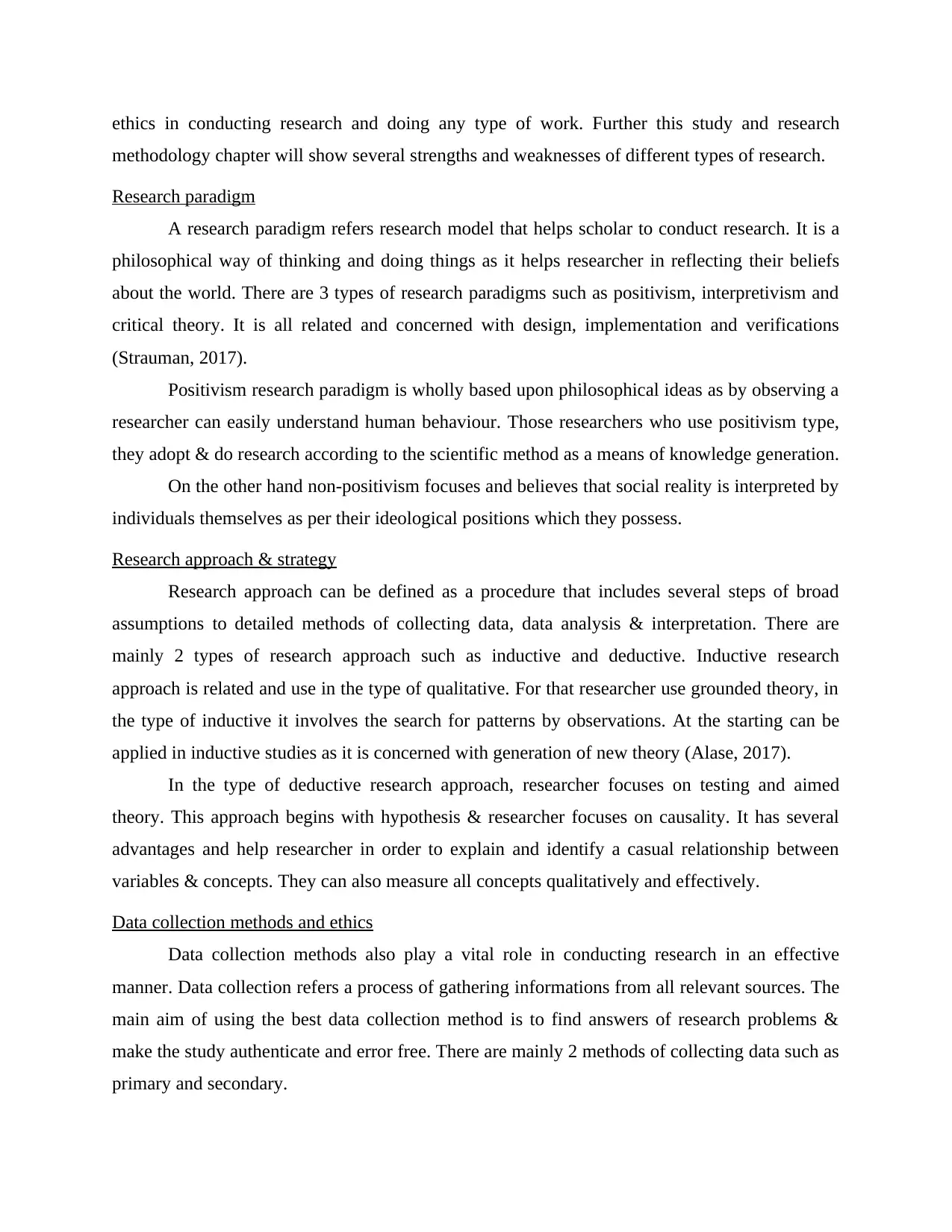
ethics in conducting research and doing any type of work. Further this study and research
methodology chapter will show several strengths and weaknesses of different types of research.
Research paradigm
A research paradigm refers research model that helps scholar to conduct research. It is a
philosophical way of thinking and doing things as it helps researcher in reflecting their beliefs
about the world. There are 3 types of research paradigms such as positivism, interpretivism and
critical theory. It is all related and concerned with design, implementation and verifications
(Strauman, 2017).
Positivism research paradigm is wholly based upon philosophical ideas as by observing a
researcher can easily understand human behaviour. Those researchers who use positivism type,
they adopt & do research according to the scientific method as a means of knowledge generation.
On the other hand non-positivism focuses and believes that social reality is interpreted by
individuals themselves as per their ideological positions which they possess.
Research approach & strategy
Research approach can be defined as a procedure that includes several steps of broad
assumptions to detailed methods of collecting data, data analysis & interpretation. There are
mainly 2 types of research approach such as inductive and deductive. Inductive research
approach is related and use in the type of qualitative. For that researcher use grounded theory, in
the type of inductive it involves the search for patterns by observations. At the starting can be
applied in inductive studies as it is concerned with generation of new theory (Alase, 2017).
In the type of deductive research approach, researcher focuses on testing and aimed
theory. This approach begins with hypothesis & researcher focuses on causality. It has several
advantages and help researcher in order to explain and identify a casual relationship between
variables & concepts. They can also measure all concepts qualitatively and effectively.
Data collection methods and ethics
Data collection methods also play a vital role in conducting research in an effective
manner. Data collection refers a process of gathering informations from all relevant sources. The
main aim of using the best data collection method is to find answers of research problems &
make the study authenticate and error free. There are mainly 2 methods of collecting data such as
primary and secondary.
methodology chapter will show several strengths and weaknesses of different types of research.
Research paradigm
A research paradigm refers research model that helps scholar to conduct research. It is a
philosophical way of thinking and doing things as it helps researcher in reflecting their beliefs
about the world. There are 3 types of research paradigms such as positivism, interpretivism and
critical theory. It is all related and concerned with design, implementation and verifications
(Strauman, 2017).
Positivism research paradigm is wholly based upon philosophical ideas as by observing a
researcher can easily understand human behaviour. Those researchers who use positivism type,
they adopt & do research according to the scientific method as a means of knowledge generation.
On the other hand non-positivism focuses and believes that social reality is interpreted by
individuals themselves as per their ideological positions which they possess.
Research approach & strategy
Research approach can be defined as a procedure that includes several steps of broad
assumptions to detailed methods of collecting data, data analysis & interpretation. There are
mainly 2 types of research approach such as inductive and deductive. Inductive research
approach is related and use in the type of qualitative. For that researcher use grounded theory, in
the type of inductive it involves the search for patterns by observations. At the starting can be
applied in inductive studies as it is concerned with generation of new theory (Alase, 2017).
In the type of deductive research approach, researcher focuses on testing and aimed
theory. This approach begins with hypothesis & researcher focuses on causality. It has several
advantages and help researcher in order to explain and identify a casual relationship between
variables & concepts. They can also measure all concepts qualitatively and effectively.
Data collection methods and ethics
Data collection methods also play a vital role in conducting research in an effective
manner. Data collection refers a process of gathering informations from all relevant sources. The
main aim of using the best data collection method is to find answers of research problems &
make the study authenticate and error free. There are mainly 2 methods of collecting data such as
primary and secondary.
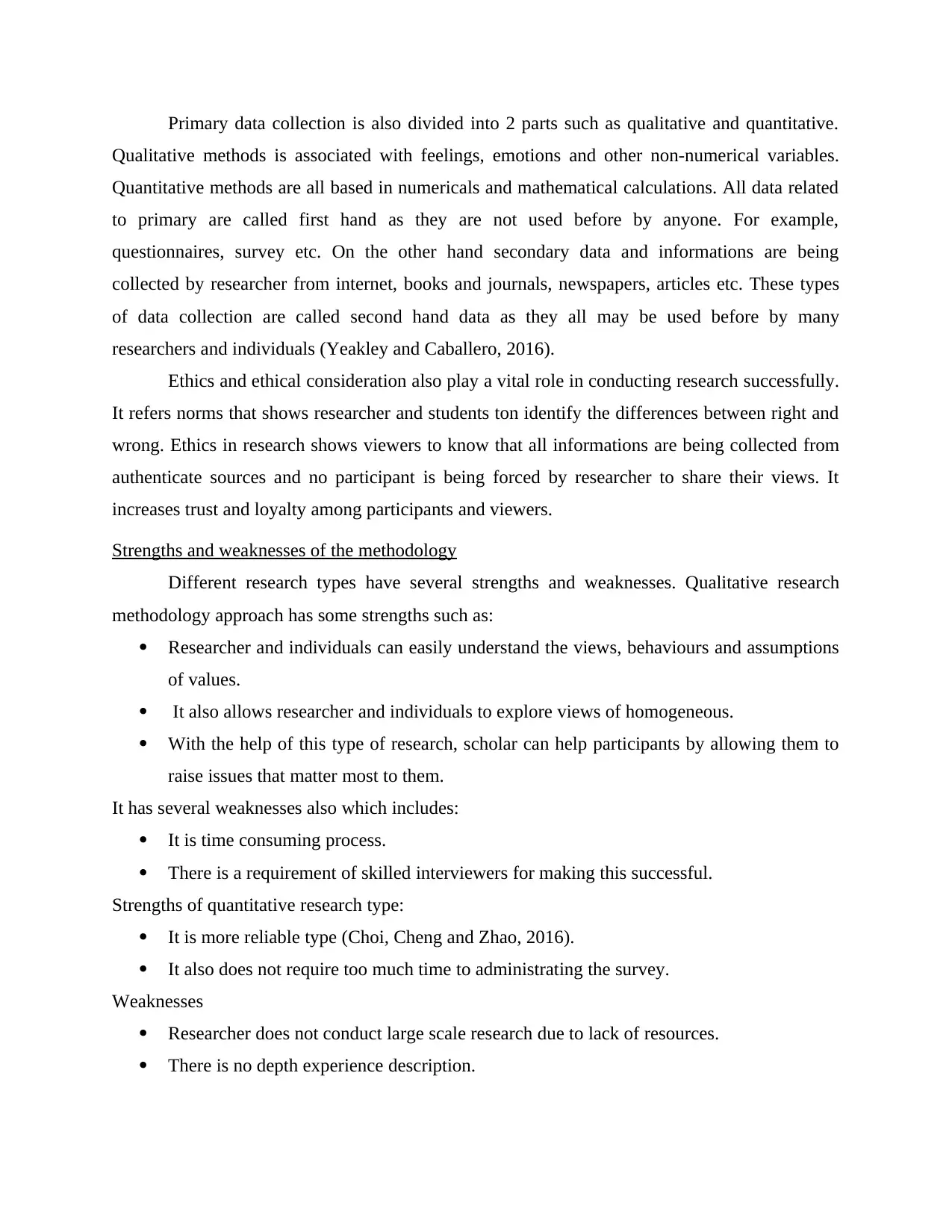
Primary data collection is also divided into 2 parts such as qualitative and quantitative.
Qualitative methods is associated with feelings, emotions and other non-numerical variables.
Quantitative methods are all based in numericals and mathematical calculations. All data related
to primary are called first hand as they are not used before by anyone. For example,
questionnaires, survey etc. On the other hand secondary data and informations are being
collected by researcher from internet, books and journals, newspapers, articles etc. These types
of data collection are called second hand data as they all may be used before by many
researchers and individuals (Yeakley and Caballero, 2016).
Ethics and ethical consideration also play a vital role in conducting research successfully.
It refers norms that shows researcher and students ton identify the differences between right and
wrong. Ethics in research shows viewers to know that all informations are being collected from
authenticate sources and no participant is being forced by researcher to share their views. It
increases trust and loyalty among participants and viewers.
Strengths and weaknesses of the methodology
Different research types have several strengths and weaknesses. Qualitative research
methodology approach has some strengths such as:
Researcher and individuals can easily understand the views, behaviours and assumptions
of values.
It also allows researcher and individuals to explore views of homogeneous.
With the help of this type of research, scholar can help participants by allowing them to
raise issues that matter most to them.
It has several weaknesses also which includes:
It is time consuming process.
There is a requirement of skilled interviewers for making this successful.
Strengths of quantitative research type:
It is more reliable type (Choi, Cheng and Zhao, 2016).
It also does not require too much time to administrating the survey.
Weaknesses
Researcher does not conduct large scale research due to lack of resources.
There is no depth experience description.
Qualitative methods is associated with feelings, emotions and other non-numerical variables.
Quantitative methods are all based in numericals and mathematical calculations. All data related
to primary are called first hand as they are not used before by anyone. For example,
questionnaires, survey etc. On the other hand secondary data and informations are being
collected by researcher from internet, books and journals, newspapers, articles etc. These types
of data collection are called second hand data as they all may be used before by many
researchers and individuals (Yeakley and Caballero, 2016).
Ethics and ethical consideration also play a vital role in conducting research successfully.
It refers norms that shows researcher and students ton identify the differences between right and
wrong. Ethics in research shows viewers to know that all informations are being collected from
authenticate sources and no participant is being forced by researcher to share their views. It
increases trust and loyalty among participants and viewers.
Strengths and weaknesses of the methodology
Different research types have several strengths and weaknesses. Qualitative research
methodology approach has some strengths such as:
Researcher and individuals can easily understand the views, behaviours and assumptions
of values.
It also allows researcher and individuals to explore views of homogeneous.
With the help of this type of research, scholar can help participants by allowing them to
raise issues that matter most to them.
It has several weaknesses also which includes:
It is time consuming process.
There is a requirement of skilled interviewers for making this successful.
Strengths of quantitative research type:
It is more reliable type (Choi, Cheng and Zhao, 2016).
It also does not require too much time to administrating the survey.
Weaknesses
Researcher does not conduct large scale research due to lack of resources.
There is no depth experience description.
⊘ This is a preview!⊘
Do you want full access?
Subscribe today to unlock all pages.

Trusted by 1+ million students worldwide
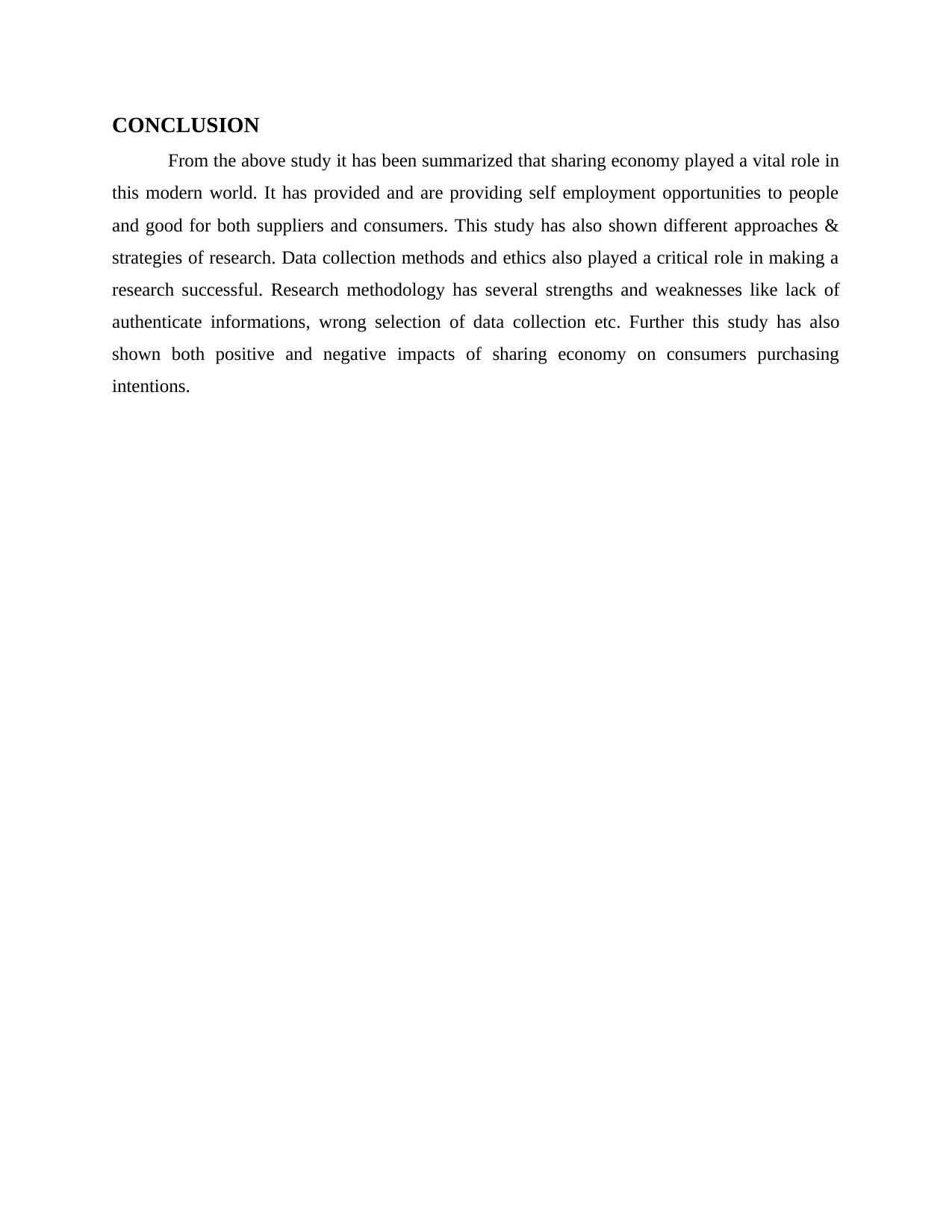
CONCLUSION
From the above study it has been summarized that sharing economy played a vital role in
this modern world. It has provided and are providing self employment opportunities to people
and good for both suppliers and consumers. This study has also shown different approaches &
strategies of research. Data collection methods and ethics also played a critical role in making a
research successful. Research methodology has several strengths and weaknesses like lack of
authenticate informations, wrong selection of data collection etc. Further this study has also
shown both positive and negative impacts of sharing economy on consumers purchasing
intentions.
From the above study it has been summarized that sharing economy played a vital role in
this modern world. It has provided and are providing self employment opportunities to people
and good for both suppliers and consumers. This study has also shown different approaches &
strategies of research. Data collection methods and ethics also played a critical role in making a
research successful. Research methodology has several strengths and weaknesses like lack of
authenticate informations, wrong selection of data collection etc. Further this study has also
shown both positive and negative impacts of sharing economy on consumers purchasing
intentions.
Paraphrase This Document
Need a fresh take? Get an instant paraphrase of this document with our AI Paraphraser
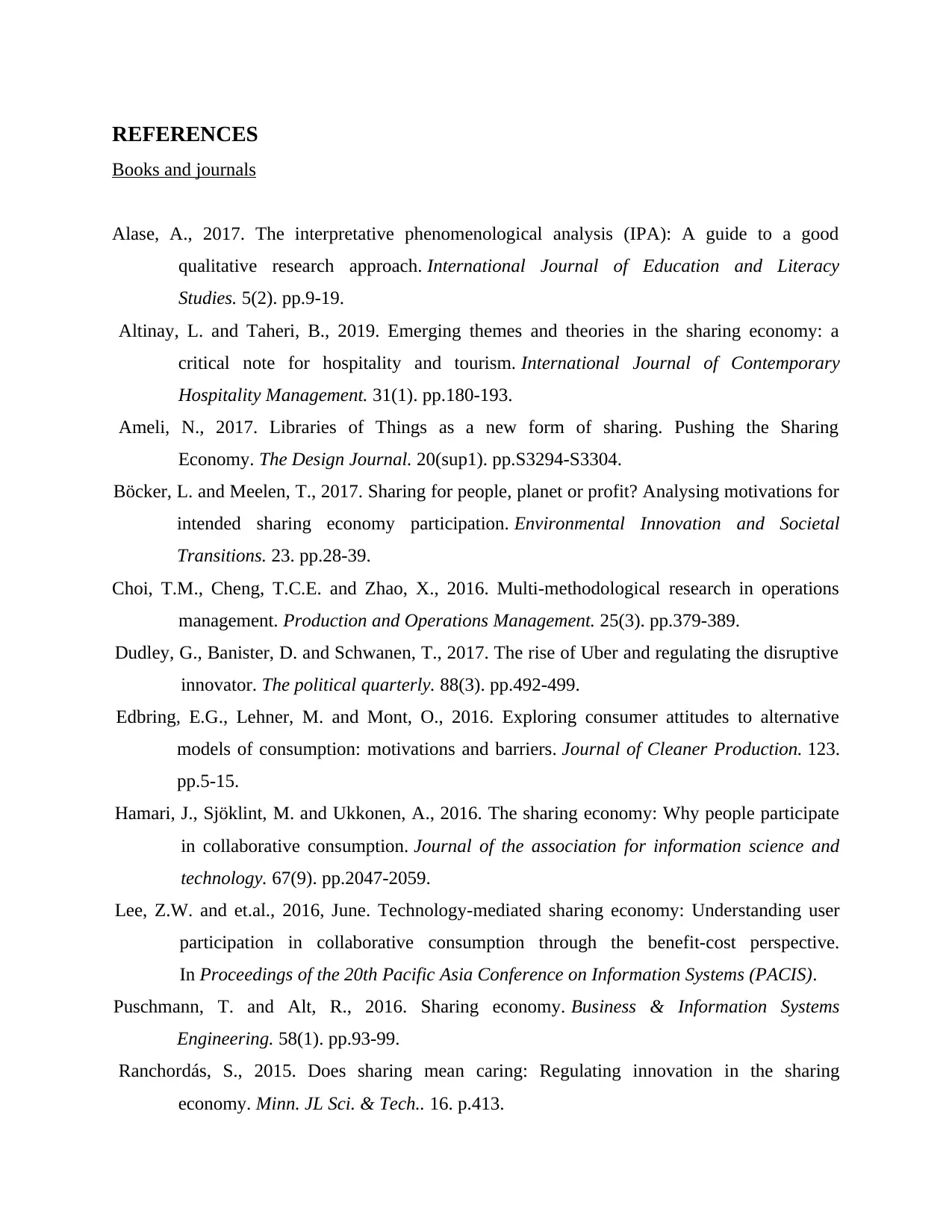
REFERENCES
Books and journals
Alase, A., 2017. The interpretative phenomenological analysis (IPA): A guide to a good
qualitative research approach. International Journal of Education and Literacy
Studies. 5(2). pp.9-19.
Altinay, L. and Taheri, B., 2019. Emerging themes and theories in the sharing economy: a
critical note for hospitality and tourism. International Journal of Contemporary
Hospitality Management. 31(1). pp.180-193.
Ameli, N., 2017. Libraries of Things as a new form of sharing. Pushing the Sharing
Economy. The Design Journal. 20(sup1). pp.S3294-S3304.
Böcker, L. and Meelen, T., 2017. Sharing for people, planet or profit? Analysing motivations for
intended sharing economy participation. Environmental Innovation and Societal
Transitions. 23. pp.28-39.
Choi, T.M., Cheng, T.C.E. and Zhao, X., 2016. Multi‐methodological research in operations
management. Production and Operations Management. 25(3). pp.379-389.
Dudley, G., Banister, D. and Schwanen, T., 2017. The rise of Uber and regulating the disruptive
innovator. The political quarterly. 88(3). pp.492-499.
Edbring, E.G., Lehner, M. and Mont, O., 2016. Exploring consumer attitudes to alternative
models of consumption: motivations and barriers. Journal of Cleaner Production. 123.
pp.5-15.
Hamari, J., Sjöklint, M. and Ukkonen, A., 2016. The sharing economy: Why people participate
in collaborative consumption. Journal of the association for information science and
technology. 67(9). pp.2047-2059.
Lee, Z.W. and et.al., 2016, June. Technology-mediated sharing economy: Understanding user
participation in collaborative consumption through the benefit-cost perspective.
In Proceedings of the 20th Pacific Asia Conference on Information Systems (PACIS).
Puschmann, T. and Alt, R., 2016. Sharing economy. Business & Information Systems
Engineering. 58(1). pp.93-99.
Ranchordás, S., 2015. Does sharing mean caring: Regulating innovation in the sharing
economy. Minn. JL Sci. & Tech.. 16. p.413.
Books and journals
Alase, A., 2017. The interpretative phenomenological analysis (IPA): A guide to a good
qualitative research approach. International Journal of Education and Literacy
Studies. 5(2). pp.9-19.
Altinay, L. and Taheri, B., 2019. Emerging themes and theories in the sharing economy: a
critical note for hospitality and tourism. International Journal of Contemporary
Hospitality Management. 31(1). pp.180-193.
Ameli, N., 2017. Libraries of Things as a new form of sharing. Pushing the Sharing
Economy. The Design Journal. 20(sup1). pp.S3294-S3304.
Böcker, L. and Meelen, T., 2017. Sharing for people, planet or profit? Analysing motivations for
intended sharing economy participation. Environmental Innovation and Societal
Transitions. 23. pp.28-39.
Choi, T.M., Cheng, T.C.E. and Zhao, X., 2016. Multi‐methodological research in operations
management. Production and Operations Management. 25(3). pp.379-389.
Dudley, G., Banister, D. and Schwanen, T., 2017. The rise of Uber and regulating the disruptive
innovator. The political quarterly. 88(3). pp.492-499.
Edbring, E.G., Lehner, M. and Mont, O., 2016. Exploring consumer attitudes to alternative
models of consumption: motivations and barriers. Journal of Cleaner Production. 123.
pp.5-15.
Hamari, J., Sjöklint, M. and Ukkonen, A., 2016. The sharing economy: Why people participate
in collaborative consumption. Journal of the association for information science and
technology. 67(9). pp.2047-2059.
Lee, Z.W. and et.al., 2016, June. Technology-mediated sharing economy: Understanding user
participation in collaborative consumption through the benefit-cost perspective.
In Proceedings of the 20th Pacific Asia Conference on Information Systems (PACIS).
Puschmann, T. and Alt, R., 2016. Sharing economy. Business & Information Systems
Engineering. 58(1). pp.93-99.
Ranchordás, S., 2015. Does sharing mean caring: Regulating innovation in the sharing
economy. Minn. JL Sci. & Tech.. 16. p.413.
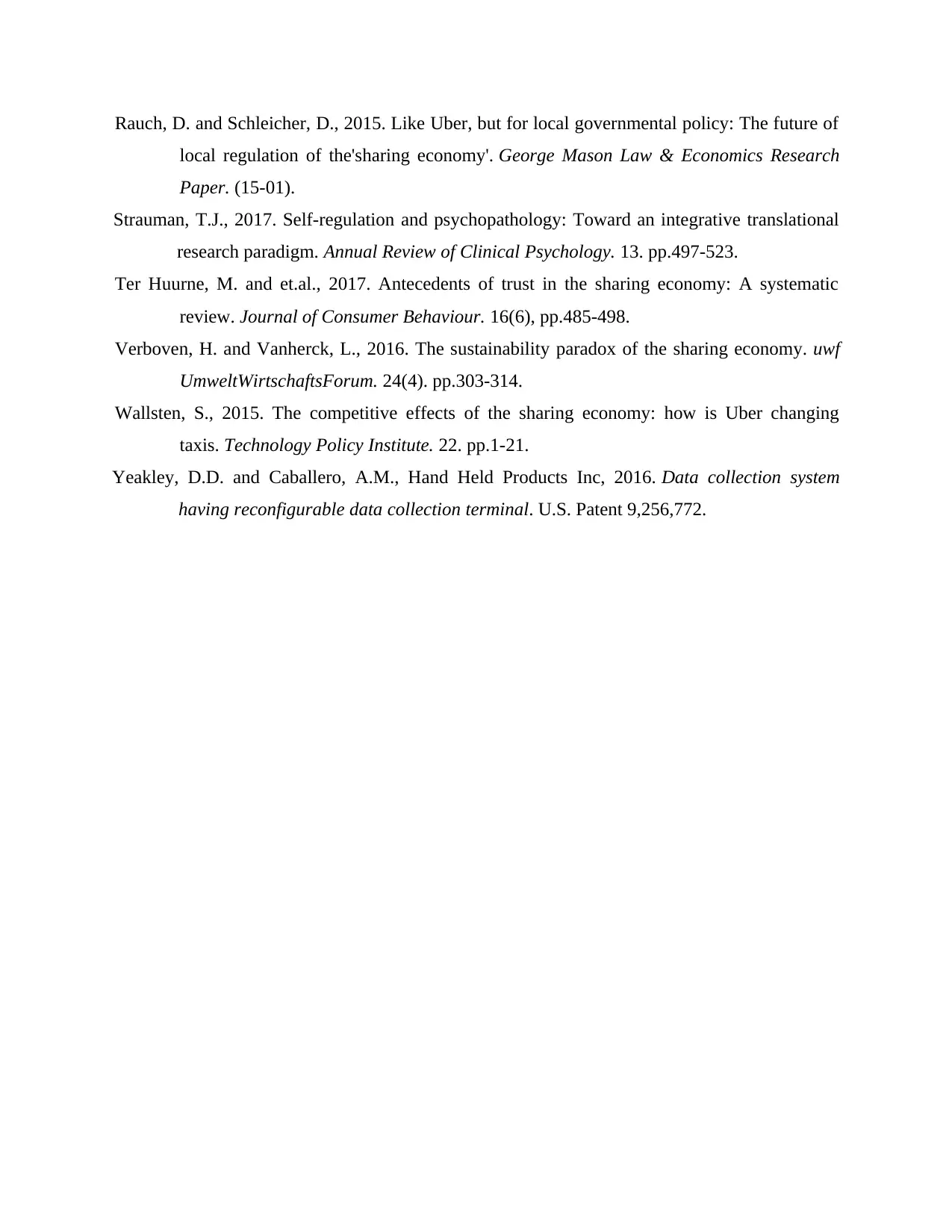
Rauch, D. and Schleicher, D., 2015. Like Uber, but for local governmental policy: The future of
local regulation of the'sharing economy'. George Mason Law & Economics Research
Paper. (15-01).
Strauman, T.J., 2017. Self-regulation and psychopathology: Toward an integrative translational
research paradigm. Annual Review of Clinical Psychology. 13. pp.497-523.
Ter Huurne, M. and et.al., 2017. Antecedents of trust in the sharing economy: A systematic
review. Journal of Consumer Behaviour. 16(6), pp.485-498.
Verboven, H. and Vanherck, L., 2016. The sustainability paradox of the sharing economy. uwf
UmweltWirtschaftsForum. 24(4). pp.303-314.
Wallsten, S., 2015. The competitive effects of the sharing economy: how is Uber changing
taxis. Technology Policy Institute. 22. pp.1-21.
Yeakley, D.D. and Caballero, A.M., Hand Held Products Inc, 2016. Data collection system
having reconfigurable data collection terminal. U.S. Patent 9,256,772.
local regulation of the'sharing economy'. George Mason Law & Economics Research
Paper. (15-01).
Strauman, T.J., 2017. Self-regulation and psychopathology: Toward an integrative translational
research paradigm. Annual Review of Clinical Psychology. 13. pp.497-523.
Ter Huurne, M. and et.al., 2017. Antecedents of trust in the sharing economy: A systematic
review. Journal of Consumer Behaviour. 16(6), pp.485-498.
Verboven, H. and Vanherck, L., 2016. The sustainability paradox of the sharing economy. uwf
UmweltWirtschaftsForum. 24(4). pp.303-314.
Wallsten, S., 2015. The competitive effects of the sharing economy: how is Uber changing
taxis. Technology Policy Institute. 22. pp.1-21.
Yeakley, D.D. and Caballero, A.M., Hand Held Products Inc, 2016. Data collection system
having reconfigurable data collection terminal. U.S. Patent 9,256,772.
⊘ This is a preview!⊘
Do you want full access?
Subscribe today to unlock all pages.

Trusted by 1+ million students worldwide
1 out of 12
Related Documents
Your All-in-One AI-Powered Toolkit for Academic Success.
+13062052269
info@desklib.com
Available 24*7 on WhatsApp / Email
![[object Object]](/_next/static/media/star-bottom.7253800d.svg)
Unlock your academic potential
Copyright © 2020–2026 A2Z Services. All Rights Reserved. Developed and managed by ZUCOL.





